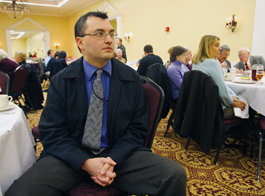home | metro silicon valley index | news | silicon valley | news article

Photograph by Felipe Buitrago
WORKING CLASS HERO: Poncho Guevara is on a mission to help local families escape poverty—and that job has gotten harder as the economy continues to slump.
Nonprofits' Nightmare
Poncho Guevara reflects on the daunting new challenges faced by the valley's poor, and the folks who serve them
By Diane Solomon
AT LAST FRIDAY'S meeting of the Democratic Century Club of Santa Clara County, luncheon speaker Poncho Guevara said there was no better day than Friday the 13th to talk about the economic nightmare that's clobbering Silicon Valley residents.
Guevara has seen the effects from up close and has a unique perspective on the situation. The executive director of Sacred Heart Community Service, one of the valley's largest social service providers, the thirtysomething Homestead High graduate previously worked for the South Bay Labor Council, where he helped start Working Partnerships and the Interfaith Council. In the '90s, Guevara helped build the Children's Health Initiative, which provides health insurance to uninsured children, and the Housing Trust to increase affordable housing.
Among the 50 members gathered under faux-crystal chandeliers in the San Jose Holiday Inn's meeting room were San Jose City Councilmembers Nora Campos, Kansen Chu, Rose Herrera and Sam Liccardo, and Santa Clara County Supervisor Liz Kniss.
Metro spoke with Guevara after the meeting.
METRO: We've seen booms and busts before. How is this downturn different?
PONCHO GUEVARA: I'm not easily shocked by the stark reality of poverty in Silicon Valley. For 45 years, Sacred Heart has been on the front lines of our regional safety net. But here's what's so alarming to me: Each month we're seeing double-digit increases in families coming to us.
Our volunteers surveyed many of the new folks coming to us, and 88 percent say it was hardship due to the economic downturn that brought them to SHCS. We're hearing countless stories of families drawn into deprivation from the ranks of the middle class—folks displaced from the real estate, financial services, retail and construction industries. Serving those with strong education, career history, employment skills and social networks is jarring on many levels. The current economic crisis is erasing that delicate line between "the poor" and "us."
Does the new state budget make this worse?
While details are still coming, the poor are taking a huge hit. It cuts benefits to welfare-to-work participants. It cuts benefits for seniors and disabled people. And unless the federal government provides extra state aid, legislators have agreed to make a billion in additional cuts to the courts, Medi-Cal, CalWORKS and in-home support for seniors.
And if that weren't enough, voters will be asked to shift $227 million from the state mental health fund and redirect $608 million from First 5's early-childhood-development program. We not only see a very bleak picture for the poor today, but perhaps an even more troubling future for the next generation.
What's the relationship of housing to this economic crisis?
It's key. Santa Clara County foreclosure rates skyrocketed in 2008, a 239 percent increase over 2007. Many working families are experiencing a financial nightmare with exploding loan payments, home values underwater for the foreseeable future and few viable refinance options.
Families losing their homes are facing increasing competition in the rental market. For those displaced into homelessness, the story is predictably bleak. The shelters and transitional housing facilities account for but a fraction of the total need, and there's wide acknowledgment that we're losing this battle.
How is this huge increase in demand affecting SHCS's ability to serve?
Like other Bay Area nonprofits, we've witnessed reductions of local government funding, a modest decrease in individual donor support and a 56 percent drop in corporate donations and sponsorships. But we're in a strong position to weather this storm.
Our goal isn't to minister to these basic essential needs but to help create a path for people to achieve economic self-sufficiency. Frankly, we're realizing more and more each day that programmatically it's impossible for us to cope with the scale of this economic catastrophe. We need to be investing more time and resources in empowering the community to address the root causes.
What can the community-at-large do about this?
SHCS's vision is to be a community united to ensure that every child and adult is free from poverty. That means it's our job to bring the community together to do everything we can to uplift those that are facing difficult challenges by providing essential services, offering tools for self-sufficiency, and ministering with dignity, compassion and respect.
Just as important as the services we provide is the opportunity for the community to be involved with us. We have 40 staff members but each day 150 to 200 volunteers are required for SHCS to be able to operate. We can only function because of the generosity and commitment our community. So I invite you to put your conscience and your beliefs into action through service, through advocacy and through generosity.
Right now, financial support is our most critical need. People can go online and donate money or they can donate their time by volunteering. Our website has information about how we can help you organize a drive to raise funds, food or clothing. Or call us.
Also, please advocate for us. Understand the impact of the decisions that our legislators are making right now on the poor and lend your voices to these discussions.
For more information, go online to www.SacredHeartCommunityService.org
Send a letter to the editor about this story.
|
|
|
|
|
|